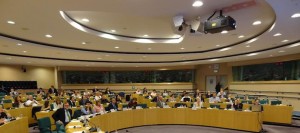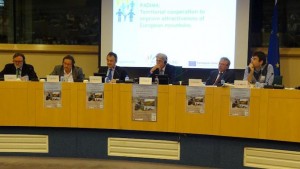27/06/2012
PADIMA (Policies Against Depopulation In Mountain Areas) final conference gathered some 100 participants, mainly policy makers working at different levels: local, regional, national and European. The partnership is satisfied by a strong participation and involvement of MEPs from different countries and political backgrounds.
Click here to see the complete list of participants.

Context:
Demographic changes are a very complex issue that needs to be looked at a proper scale and with great care: the situation varies across European mountains and demographic trends are not totally homogenous. This is the result, on the one hand, of specific characteristics and history of the different areas and, on the other hand, of strategies implemented by local and regional authorities in the past years to attract new inhabitants and businesses.
PADIMA partners consider demographic change as both a challenge and an opportunity for mountain areas. We have realised that many problems come from:
- Insufficient strategic thinking on this issue from many national, regional or local authorities facing this change,
- Insufficient work on the territorial image, and/or
- Lack of infrastructures and public services to offer to current or potential new mountain inhabitants.
Therefore, PADIMA results have been debated with other regions’ representatives on June 27th in the European Parliament, providing some solutions to these 3 depopulation problems.
For more information about the content of this event, please refer to the agenda.
The presentations delivered at this conference are available below:
- Project’s presentation and main achievements, Maria Grazia Perdana, ERSAF, Lombardy, Italy,
- What demographic trends have been observed during the last 20 years in the study areas? Federica Corrado, Province of Torino, Italy,
- How to approach depopulation in an integrated way? Rønning Dag, Chairman of the County Council, Norway,
- From theory to practice: How to transfer PADIMA good practices to improve the existing situation? Kjerstin Spångberg, project manager, Buskerud, Norway
- Services, a condition for the quality of life in mountain and rural areas, Jaime Escribano Pizarro, professor of rural geography at the University of Valencia, Spain
Photo: Torunn Kornstad
The articles regarding this conference are available below:
- Press release announcing the conference
- “Diario de Teruel” article, June 27, 2012
- “Diario de Teruel” article, June 28, 2012
- “La Comarca” article, June 29, 2012
Click here to SEE PADIMA final guide
Click here to listen the recordings of the event
Photo: The European Parliament, Brussels
Padima is co-financed by the ERDF and by the INTERREG IVC programme![]()














